2023 EMBL Australia Post Graduate Symposium – Moving Forward Through Collaboration
1-3 November, garvan institute of medical research, sydney

In 2023, we celebrated the 10th anniversary of the first EMBL Australia Postgraduate Symposium (EAPS) at the Garvan Institute of Medical Research in Sydney. Despite the long-lasting economic impact of COVID-19, we received generous sponsorship from both industry and academic institutes, enabling us to bring more than 100 postgraduate students from across Australia.
This year’s EAPS was themed “Forward Through Collaboration” and aimed to provide a platform for fellow students to build networks and engage in collaborations after the isolating experience of COVID-19. The symposium was divided into multiple themed sessions – including: blue-sky thinking, when science meets art, thinking outside the box, solving the problems of tomorrow, learning from experience and forward through collaboration – each portraying important stories and insights from our large group of guest speakers.
Importantly, all students were given the opportunity to showcase their research through either oral presentations, flash talks, poster presentations or the image competition. This prompted great discussions and feedbacks from peers and senior researchers. Congratulations to the following prize winners for their wonderful achievements:
- Best Oral Prize – Vivienne Kaiser (Children’s Medical Research Institute)
- Best Poster Prize – Emilie Wong (Children’s Medical Research Institute)
- Image competition winner – Khan Nguyen (Peter MacCallum Cancer Centre)
Thank you to EMBL Australia Student Programs Coordinator Ricki Mailloux and all members of the organising committee, who volunteered their time to make this event possible: Antonia Cadell (Logistics), Bonnie Werner (Secretary), Daniel Reed (Logistics), Dilys Lam (Secretary), Dylan Carter-Crusack (Treasurer), Helen King (Logistics), Ibraheem Nasir (Marketing), Kate Gunther (Marketing), Kevin (Yansong) Lu (Chair), Michelle Devadason (Treasurer), Nathaniel Napoli (Marketing) and Rebecca Dagnan (Marketing).
– written by Kevin (Yansong) Lu (EAPS 2023 Chair)

2022 EMBL Australia Post Graduate Symposium – Breaking Barriers, Building Bridges
9-11 November, Bio21 Institute, Melbourne

The 9th annual EMBL Australia Postgraduate Symposium (EAPS) was held from 9 to 11 November 2022. The theme of the event was “Breaking Barriers, Building Bridges” and it was hosted in person at the Bio21 Institute in Melbourne. The event provided an intimate experience for emerging young researchers to be inspired and to network, welcoming 55 students from across the country.
This EAPS event was organised by PhD students from across Australia, and brought together a variety of plenary speakers, including: Prof Melissa Southey, Dr Sebastian Furness, Prof Marnie Blewitt, Dr Jazmina Gonzalez Cruz, Dr Anai Gonzalez Cordero, Prof Alan Cowman and Dr Fernando Fonseca Guimaraes. An industry talk was delivered by Dr Tina Lavranos, who spoke about the journey of scientific discovery, from science to business.
Themes covered were:
- Genomics and computational biology
- Proteins and structural biology
- Epigenetics and development
- Cancer biology
- Molecular and cell biology
- Infection and immunity
This year’s EAPS also provided an opportunity for students to present their research in a variety of ways. The following prizes were awarded:
Best Oral Presentation:
- Olivia Stonehouse
- Faiqa Mudassar
- Jessica Beecroft (People’s choice)
Best Lightning Talk:
- Jessica Mannekan
- Mitchell Hallam
- Swathi Muralidhar (People’s choice)
Best Poster:
- Swathi Muralidhar
- Nga T. Lam
- Nathaniel Napoli (People’s Choice)

2021 EMBL Australia Postgraduate Symposium – On Giants’ Shoulders: Adapting to an Ever-Changing World
10-12 November 2021, Hybrid of virtual and in-person events

The eighth annual EMBL Australia Postgraduate Symposium (EAPS) was conducted from
November 10th to 12th, 2021, with the theme “On Giants’ Shoulders: Adapting to an Ever-Changing World.”
This EAPS event introduced a novel hybrid attendance format, in which delegates could choose between virtual/in-person and purely virtual attendance. EAPS 2021 was also the first to include multiple in-person venues, with delegates being hosted in Adelaide, Melbourne, and Brisbane on the final day.
#2021EAPS was an exciting and stimulating opportunity for emerging scientists to increase their knowledge about current research in life and environmental sciences, be inspired by the career progression of leading researchers in their field, and present their work to their peers. It was organised by a diverse committee of exceptional postgraduate students.
Guest Speakers included:
Dr. Senthil Arumugam, Prof. Lisa Butler, Prof. Alicia Oshlack, Prof. Jose Polo, Dr. Beng-Kah Song, Prof. Ana Traven, Prof. Peter Dearden, Dr. Braydon Meyer, Dr. Joey Man, Dr. Sepehr Talebian, Dr. Josh Hardy, Dr. Anna-Sophie Jurgens, Dr. Will Grant.
The following awards were given:

Twitter contest winner: Isabelle Capell-Hattam
Oral presentations:
- First Prize: Caitlin Ung
- Second Prize: Mikaeylah Davidson
- Third Prize: Alexandra Boyling
Lightning talks:
- First Place: Jack Chan
- Second Place: Wenxin Hu
- Third Place: Michael Trpceski
Poster presentations:
- First Place: Eugenia Ferreiro
- Second Place: Miro Astore
- People’s Choice: Emily Vohralik
2020 EMBL Australia Postgraduate Symposium (EAPS) – To Innovation and Beyond
11 – 13 novemBER, VIRTUAL
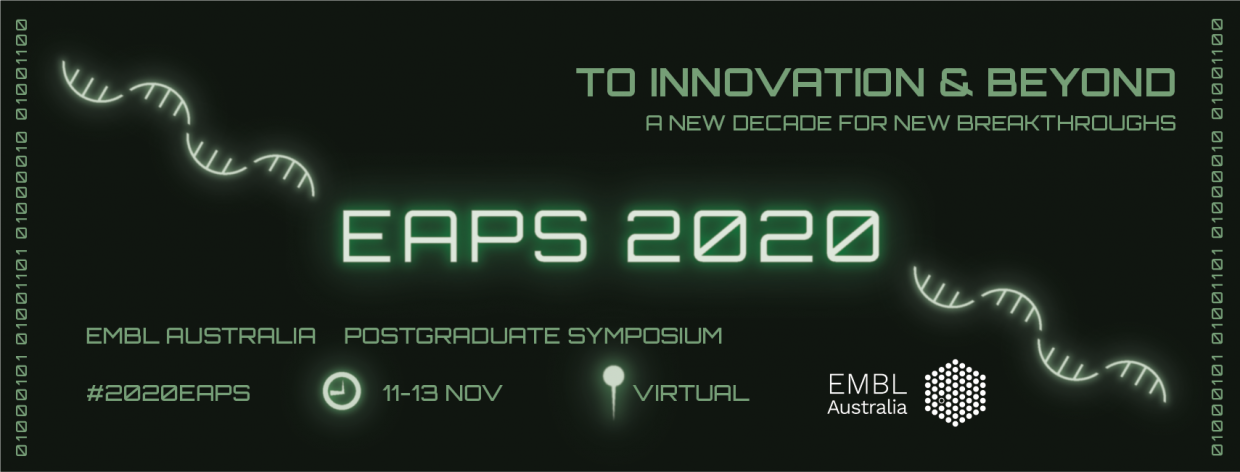
The seventh annual EMBL Australia Postgraduate Symposium (EAPS) titled “To Innovation and Beyond: A new decade for new breakthroughs” was held online on Wednesday, 11th – Friday, 13th November 2020. Following the emergence of COVID-19 as a global pandemic, this traditionally in-person event wholly represented the innovative conference theme as it quickly transformed into a highly accessible virtual experience.
Organised by a diverse committee of exceptional postgraduate students, 2020 EAPS was an exciting and stimulating opportunity for emerging scientists to be inspired by the career progression of world-leading researchers, to meaningfully interact and connect with the EAPS scientific community, and share their exciting research findings in an empowering student-focused environment.
2020 EAPS was attended by more than 135 delegates from all around Australia, with 80 poster presentations, 18 selected oral presentations and eight invited plenary presentations given over the course of the three-day symposium.
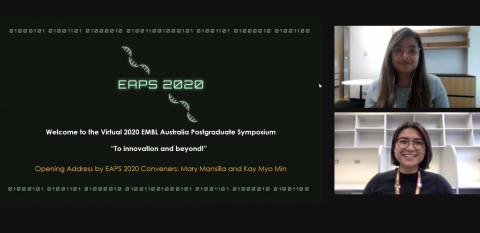
The event was warmly welcomed by Professor James Whisstock (Scientific Head of EMBL Australia) and was attended by a number of distinguished researchers, including: the Keynote Address by Prof. Mark Post (scientist behind the world’s first slaughter-free hamburger); COVID-19 Spotlight Plenary Address by Prof. Kanta Subbarao (Director of the WHO Collaborating Centre for Reference and Research on Influenza); plenary presentations by Prof. Alicia Oshlack, Prof. Melissa Little, Prof. Vanessa Hayes, Prof. David Lynn, A/Prof. Nicholas Opie, Dr. Anai Gonzalez-Cordero; and a panel discussion with A/Prof. Carlos Salomon Gallo, Dr. Sarah Stephenson, Dr. Bianca Le, and Dr. Martin Engel.
The virtual delivery of 2020 EAPS was overwhelmingly positive.
The conference utilised an award-winning online conference platform (Whova) to deliver oral presentations, view student posters and their accompanying video presentations, and to facilitate the networking, engagement and discussion that attendees typically engage in at traditional conferences.
Delegates in attendance also enthusiastically participated in social activities, such as the research image competition, Twitter engagement competition, amusing online icebreakers to get to know each other, sharing peer-reviewed research papers and genuinely connecting through the many lowlights and highlights of their own research journey.
The COVID-19 pandemic has both exacerbated numerous existing inequalities and posed many new challenges within the academic research ecosystem. 2020 EAPS actively attempted to address many of these barriers with systemic solutions and individual action. In their roles as the elected co-convenors for 2020 EAPS, Mary Mansilla and Kay Myo Min, strongly championed for equity, diversity, inclusion and access in medical research and academia. With the unwavering support of EMBL Australia and the EAPS Executive Committee, 2020 EAPS introduced numerous policies and practices throughout the conference to ensure equal opportunity for all invited speakers, students, and delegates.
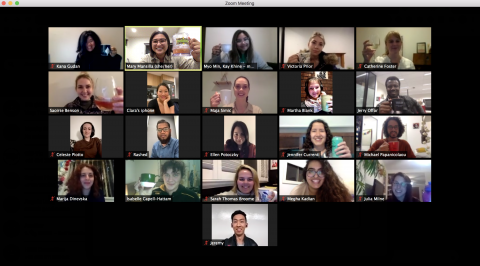
These initiatives included: the provision of registration and accessibility grants for disadvantaged attendees; an Acknowledgement of Country in the conference welcome address; actively seeking to include and promote a diverse range of invited plenary speakers and panel members; respectfully asking and correctly using an individual’s pronouns; and actively learning how to correctly pronounce the names of all delegates (especially when introducing them as an invited plenary or selected oral presentation).
These inclusive practices were ultimately integral to the success and significance of 2020 EAPS. as it allowed the next generation of scientific researchers to benefit from the diversity of perspectives, experiences, and disciplines offered by their fellow researchers.
We thank the 2020 Executive Committee for their tireless work in curating a brilliant virtual conference amid the COVID-19 pandemic, all organised via Zoom and emails: Mary Mansilla, Kay Myo Min, Jennifer Currenti, Marija Simic, Isabelle Capell-Hattam, Celeste Piotto, Michael Papanicolaou, Mohammad Rasheduzzaman, Martha Blank, Jeremy Han, Catherine Foster, Victoria Prior, Marija Dinevska, Jerry Offor, Sarah Thomas Broome, Julia Milne, Clara Pribadi, Ellen Potoczky, Megha Kadian, and Saoirse Benson.
2019 EMBL Australia Postgraduate Symposium (EAPS) – From Models to Systems
27 – 29 november, victorian comprehensive cancer centre, melbourne
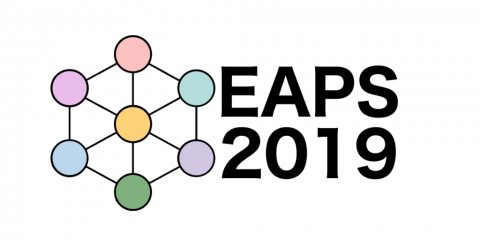
The 6th annual EMBL Australia Postgraduate Symposium (EAPS) was held at the Peter MacCallum Cancer Centre and the Victorian Comprehensive Cancer Centre in Melbourne from November 27th to 29th. More than 120 delegates from all across Australia participated and 84 students delivered oral and poster presentations during the symposium.
The theme of the three-day meeting was: From Models to Systems – deciphering biological complexity. The programme covered a wide variety of topics spanning development and regeneration, molecular and cellular biology, computational and systems biology, ecology and environmental sciences, immunology and cancer, as well as translational science and drug discovery. Importantly, all of the invited speakers not only shared their passion for scientific research, but also openly shared their personal scientific career journeys and provided valuable insights they gained along the way.
A warm welcome was provided from EMBL Austrlalia Scientific Head Prof. James Whisstock, the keynote address was delivered by Prof. Christine Wells and plenary sessions by A/Prof. Enzo Porrello, Dr. Kate Lawlor, Dr. Irene Gallego Romero, Dr. Talitha Santini, Prof. Matt Sweet, Prof. Ricky Johnstone, Dr. Damien Bates and Dr. Chris Langmead. The panel discussion “Life in Academia Today” provided a very broad and diverse perspective on the possibile future career options for emerging scientists in Australia and overseas.
Many high-quality student presentations were endorsed and highlighted by the invited speakers. This year’s awards were presented to:
- Best oral presentation: Jody McKellar (Flinders University)
- Highly commended oral presentation: Elizabeth Stout (UNSW)
- Best poster presentation: Yau Chung Low (MCRI)
- Highly commended poster presentation: Lucas Newton (La Trobe)
In recognition of the importance of science communication and social media presence, this year two best Twitter prizes (sponsored by CSL) were awarded to Christina Gangemi (ARMI) & Elizabeth Stout (UNSW).
We thank the student organising committee for the great effort and making this event a success: Kenji Fujihara, Gabriel Hauswirth, Aimee Davidson, Caitlin Romanis, Celine Santiago, HuanTing Ong, Margaret Mouat, Sean So, Yasmin Alshoubaki, Alexandra-Madelaine Tichy, Gerard Pernes, Valentina Poltavets, Emma Gail and Joey Man.

2018 EMBL Australia Postgraduate Symposium (EAPS) – Translational Research
28 – 30 november, translational research Institute, brisbane
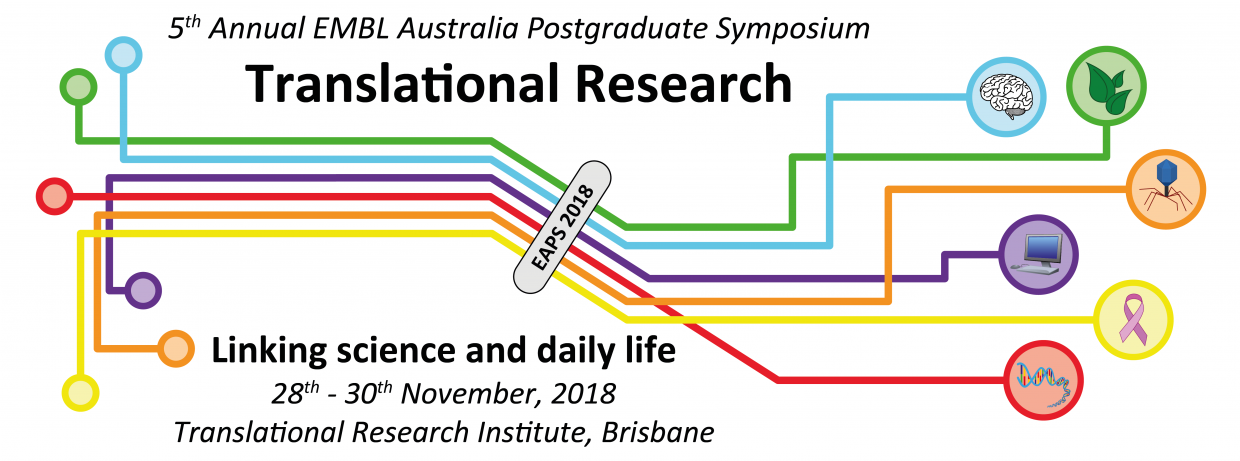
Over 140 students focussed on the importance of translatability in basic scientific research and the tools and techniques available to turn basic science discoveries into practical solutions in health and the environment. It explored a range of areas, from cellular to systems biology, bioinformatics to neurobiology and virology to ecology.
Prominent scientists delivered inspiring presentations, including keynote speaker Professor Ian Frazer who discussed the creation of the HPV vaccine and key factors in building a successful career. Students also heard from other researchers including, Associate Professor Natalie Sims, Associate Professor Cedric Bardy, Associate Professor Tracy Ainsworth, Dr Glen Begley, Professor Jenny Martin and Dr Kim-Anh Le Cao.
Travel grants were awarded to 22 students and over the three days, students participated in 70 poster presentations, 21 extended oral presentations and 40 short oral presentations.
The following students received awards:
- Best oral presentation: Sunyuan Zhang
- Highly commended oral presentation: Harrison Madge
- Best poster presentation, session A: James Fraser
- Best poster presentation, session B: Ankit Shukla
- SciArt Competition Winner: Sabrina Oishi
This was the first year the symposium featured a Science Meets Arts Competition. Students were invited to submit an image that captured both the science and art behind their work. The competition was very successful, with a number of strong applications received.
Thank you to the researchers who motivated and encouraged the next generation of scientists through their presentations.
Thank you to the student committee, led by Jasmina Markulic, for their hard work in preparing for this event, and ensuring that EAPS 2018 was a success for all students, researchers and sponsors. Jasmina Markulic, Sandra Brosda, Raul Gonzalez Pech, Felicitas Vernen, Elise Matuzelski, John Salamon, Constanza Martínez, Catriona Nguyen-Robertson, Kate Smith, Terence Lee, Natasha Brohier, Annette Jacobsen and Gerard Pernes.
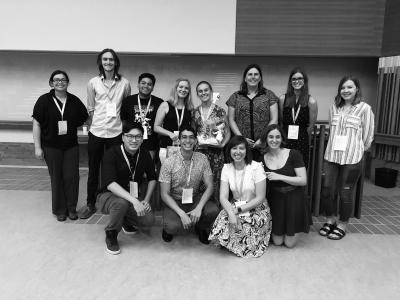
2017 EMBL Australia Postgraduate Symposium (EAPS) – Overcoming Chaos
29 November – 1 December, Garvan Institute, Sydney
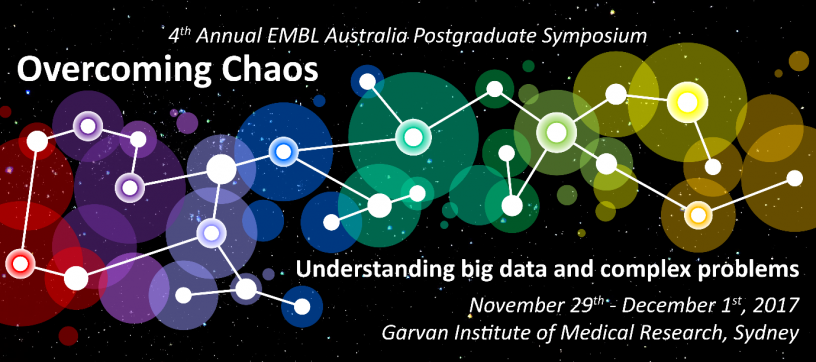
The 4th annual EMBL Australia Postgraduate Symposium (EAPS) was held in late 2017, from 29 November to 1 December at the Garvan Institute of Medical Research in Sydney.
Entitled ‘Overcoming Chaos: Understanding Big Data and Complex Problems’, the symposium focussed on the use of new technologies and techniques to conceptually and practically model both disease and the environment, with a focus on genomics and bioinformatics. Organised by a group of enterprising postgraduate students from across Australia, the symposium presented an exciting experience for young scientists embarking on careers in medical research.
The meeting included a range of plenary speakers, oral and poster presentations from students. Specifically, EAPS 2017 attracted a large number of high-calibre postgraduate students from all around Australia. Specifically, 126 students attended, with 76 poster presentations, 18 extended oral presentations, and 28 short oral presentations (Three Minute Thesis) given over the course of the three-day symposium.

The event attracted a number of leading national and international researchers who discussed their motivating research and inspiring career progression and generously doled out advice for the next generation of scientists. In addition to Professor James Whisstock (EMBL Australia Scientific Head) and Professor John Mattick (Executive Director of the Garvan Institute of Medical Research), EAPS 2017 hosted a range of keynote and plenary speakers. These included Dr Niklas Blomberg, Professor Leann Tilley, Dr Emma Sierecki, Dr Nic Waddell, Professor Terry Speed, Professor Geoff Faulkner, and Professor Grant McArthur.
In addition to 10 travel awards and 18 accommodation bursaries, there were also oral and poster presentation awards. This year, these awards were presented to:
- Best oral presentation: Kate Smith, Charles Sturt University, on the topic “The C-terminal 18 amino acid region of dengue virus ns5 regulates its subcellular localization and contains a conserved arginine residue essential for infectious virus production”.
- Highly commended oral presentation: Carolina Salazar, the University of Melbourne, on the topic of “Genomics and organoids: developing therapeutic options for mucinous ovarian cancer”.
- Best poster presentation, Session A: Madeleine Wheatley, Garvan Institute of Medical Research, on the topic of “Carfilzomib treatment targets both dormant and actively growing cells whilst preventing myeloma-induced bone loss”.
- Best poster presentation, Session B: Thao Phuong Ho-Le, University of Technology, Sydney, on the topic of “Prediction of hip fracture in post-menopausal women using artificial neural network approach”.
- Best Honours Poster: Stephanie Li, the Burnet Institute and the University of Melbourne, on the topic of “Epidemiological modelling to optimise resource allocation for HIV and tuberculosis in South Africa”.
Congratulations to all the delegates, awardees, organisers and everyone involved with EAPS 2017. It was a remarkable effort from all involved! And a massive thank you to the student committee who worked tirelessly to ensure the success of the event: Yolanda Colino (Logistics), Jasmina Markelic (Treasurer), Sandra Brosda (Marketing/Design), Autumn Bricker (Treasurer), Ashlee Caldwell (Sponsorship), Andie Erickson (Sponsorship), Jessica Anania (Marketing), Julienne O’Rourke (Convenor), Maddie Archer (Secretary), Peggy Rentsch (Logistics) and Simon Hardwell (Logistics).
We are excited to announce that the preparation for EAPS 2018 is well underway and that the symposium will be hosted by the Translational Research Institute in Brisbane from 28 – 30 November, 2018. Make sure to mark the date in your calendars!
To stay abreast of EAPS 2018 updates, please subscribe to the EMBL Australia newsletter.
2016 EMBL Australia Postgraduate Student symposium – Unravelling Nature’s Secrets
16-18 November, SAHMRI, Adelaide.
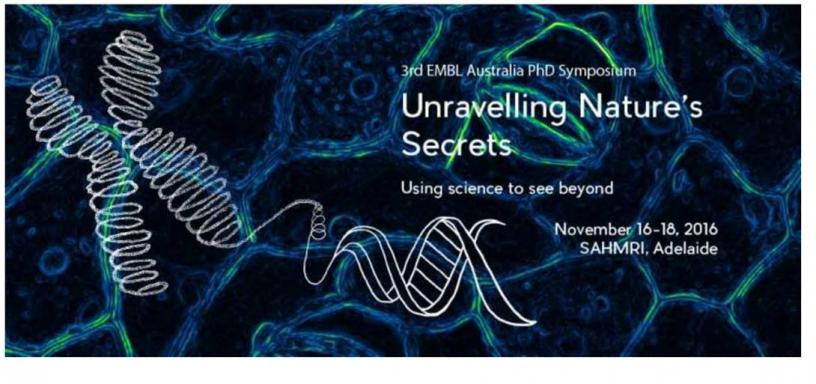
The 3rd annual EMBL Australia Student PhD symposium, ‘Unravelling Nature’s Secrets’ was held in November at the South Australian Health and Medical Research Institute (SAHMRI) in Adelaide. The symposium focused on the use of new technologies and techniques to conceptually, and practically, model both disease and the environment. It examined a range of fields including the next generation sequencing revolution, the application of innovative in vivo molecular imaging techniques, the molecular characterisation of signalling pathways, and the development of innovative drug design strategies.
The event was attended by many distinguished guests such as Professor James Whisstock (EMBL Australia Head) and Professor Steve Wesselingh (EMBL Australia Partner Laboratory Head and Executive Director, SAHMRI. In attendance were a multitude of national and international plenary speakers including Professor John Quackenbush, Professor John Mattick, Professor Ross Hannan, Professor Michelle Haber, Dr Misty Jenkins, Associate Professor David Lynn and Associate Professor Julian Heng.
Students from around the country attended. They noted that they felt inspired by their fellow students, making them excited to be part of the fantastic future of science in Australia. They also reflected on the unique opportunity the symposium offers, and its ability to facilitate the development of strong working networks among their peers.
EMBL Australia plans on continuing the PhD symposium in 2017, and will announce the venue and dates shortly.
To keep informed, please subscribe to the EMBL Australia newsletter.
2015 EMBL Australia PhD Symposium
25-27 November 2015 at the Bio21 Institute, Melbourne, Australia
The 2015 EMBL Australian Student Symposium explored the current revolution in biological sciences, the integration of large-scale biology and computational approaches to answer our biological questions. Entitled Completing the Pipeline: From Biology to Bioinformatics and Back Again, the symposium focused on research that explored fundamental biological questions on a grander scale such as ‘next-generation’ sequencing, mass spectrometry, lipidomic approaches, and large cohort studies.
It was an exciting experience for young scientists embarking on careers in biological and medical sciences. The Symposium included notable plenary speakers, oral and poster presentations from research students and early career researchers, as well as informal blackboard/panel sessions with keynote speakers.
Carrying on from the success of the inaugural 2014 EMBL Student Symposium, held at the University of New South Wales, December 3-5 2014, the 2015 symposium continued to develop a national network of students and early career researchers in Australia.
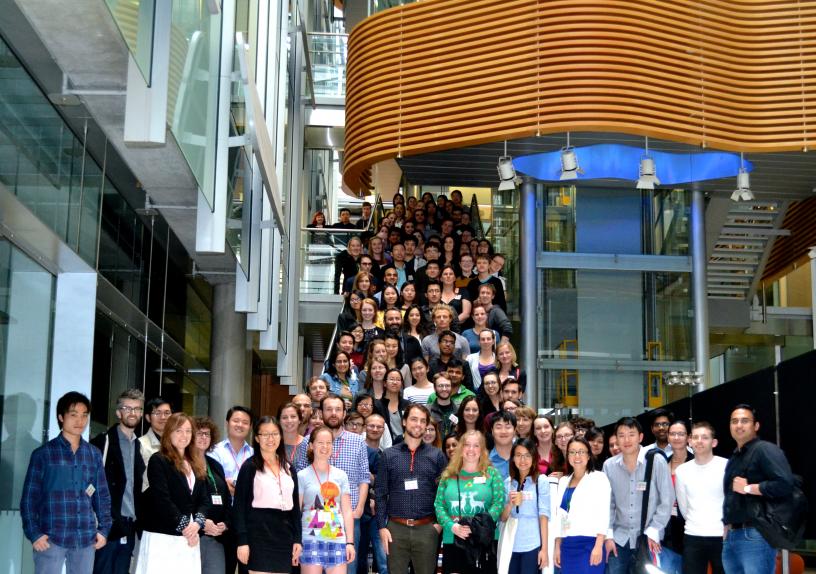
About the Symposium
The symposium was organised by students associated with EMBL Australia from universities, institutes and hospitals around Australia.
It was the only conference of its kind in Australia, bringing together students from a broad range of disciplines in a collaborative environment. Our aim was to provide research students with the ability to present their work to a professional but less intimidating audience than open-level symposiums and give them the opportunity to interact with our senior scientists on an informal level.
The exciting blend of research topics and speakers engaged scientists from broad fields and provided an excellent networking experience for students and early career researchers. The addition of informal blackboard sessions and a symposium dinner with the experienced plenary speakers offered an invaluable opportunity for delegates to meet and exchange ideas with peers and senior scientists, fostering the development of long-term associations and professional relationships and collaborations.